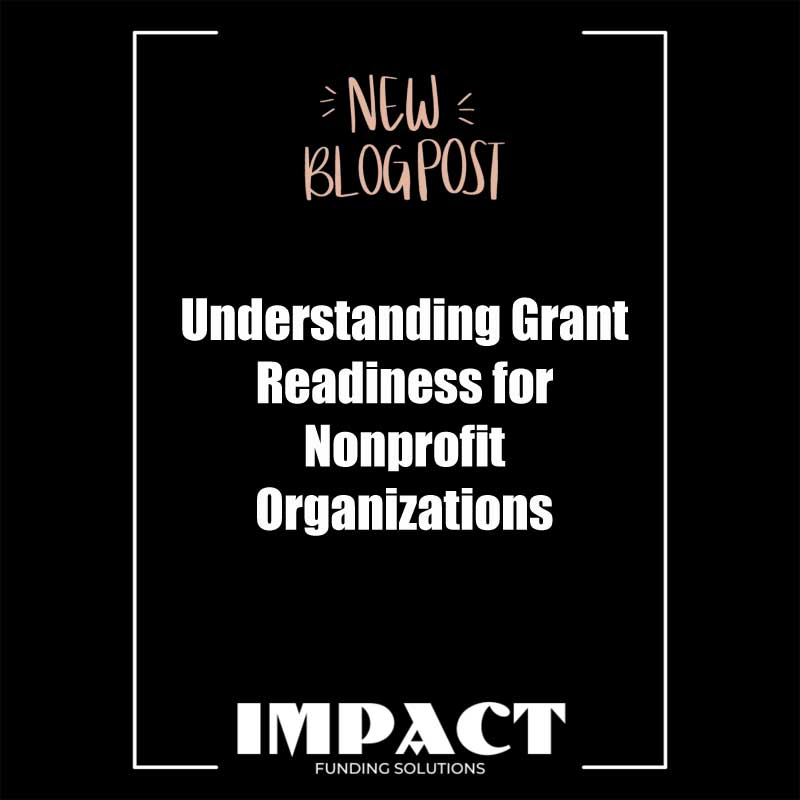Understanding Grant Readiness for Nonprofit Organizations

Understanding Grant Readiness for Nonprofit Organizations
Introduction
Understanding grant readiness for nonprofit organizations is increasingly important. Nonprofit organizations play a crucial role in addressing various societal issues, ranging from poverty alleviation to environmental conservation. These organizations often rely on grants and donations to sustain their operations and fulfill their missions. Grant readiness is an essential factor in a nonprofit's ability to secure funding. In this blog post, we will explore the concept of grant readiness and the key elements that nonprofit organizations should have in place to increase their chances of successfully obtaining grants.
Grant Readiness Defined
Grant readiness refers to a nonprofit organization's state of preparedness to seek and secure grant funding. It involves having all the necessary components in place to make a compelling case for funding to potential grantmakers. Grant readiness not only enhances an organization's ability to attract financial support but also signifies professionalism and a commitment to transparency and accountability.
Key Components of Grant Readiness
- Business Plan or Strategic Plan : A nonprofit organization should have a well-defined business or strategic plan that outlines its mission, vision, goals, and strategies for achieving them. The plan should serve as a roadmap, guiding the organization's activities and decisions.
- Budgets : Nonprofits should have budgets in place for the current fiscal year, as well as the next fiscal year. This includes both operating budgets, which cover day-to-day expenses, and program budgets, detailing the financial requirements for specific projects or initiatives. Grantmakers want to see that organizations have a clear understanding of their financial needs.
- Board of Directors : A solid and diverse board of directors is a crucial element of grant readiness. A diverse board brings different perspectives and expertise to the organization, making it more attractive to potential donors and grantmakers. Additionally, an engaged board demonstrates commitment to the organization's mission and success.
- Professional Website : In the digital age, having a professional and well-maintained website is essential. A website serves as a hub for information about the organization, its programs, and its impact. It should be user-friendly and regularly updated to provide the latest information.
- Active and Engaging Social Media Presence : Nonprofits should have an active and engaging presence on social media platforms. Social media is a powerful tool for raising awareness, engaging with supporters, and showcasing the organization's work. Grantmakers often check an organization's social media presence to gauge its level of community engagement.
- Financial Statements and Taxes : Having accurate financial statements prepared and filed taxes is crucial for grant readiness. These documents provide a clear picture of the organization's financial health and adherence to legal and regulatory requirements. Audited financials are a significant advantage, as they offer an extra layer of credibility and transparency.
The Benefits of Grant Readiness
Grant readiness is not just a checklist of requirements; it has several tangible benefits for nonprofit organizations:
- Increased Funding Opportunities : Nonprofits that are grant-ready are more likely to attract a wider range of funding opportunities from various sources, including foundations, government agencies, and private donors.
- Enhanced Credibility : Grant readiness enhances an organization's credibility. When grantmakers see that an organization has its affairs in order, they are more inclined to invest in its mission.
- Improved Planning and Strategy : Developing a business plan, budgeting, and focusing on grant readiness forces organizations to refine their strategies and set realistic goals, which ultimately leads to better long-term planning.
- Transparency and Accountability : Grant readiness signals an organization's commitment to transparency and accountability. This not only appeals to potential grantmakers but also fosters trust among supporters and the community.
- Sustainability : Being grant-ready can help nonprofit organizations establish a more sustainable financial foundation, ensuring they can continue their vital work in the long term.
Conclusion
Grant readiness is an essential aspect of nonprofit sustainability and growth. By having a clear business plan, comprehensive budgets, a strong board of directors, a professional online presence, and financial documents in order, nonprofits can position themselves for success in the highly competitive world of grant funding. These components not only increase funding opportunities but also enhance an organization's credibility, transparency, and accountability. As nonprofits continue their crucial work in addressing societal issues, grant readiness remains a vital element in their path to success.
If you have questions our would like to talk to us about our services we invite you to contact us today.

